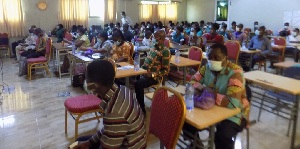Regional News of Sunday, 28 February 2021
Source: GNA
Ketu South attains 100 percent antiretroviral therapy coverage in 2020
The Ketu South Municipal Health Directorate has increased coverage of people living with HIV who know their status on antiretroviral treatment to 100 percent in 2020 from 79.4 percent in 2019.
All 302 persons diagnosed with the epidemic in 2020 were put on the therapy compared to 274 out of the total 345 diagnosed in 2019 and 324 out of 415 in 2018.
This was made known during presentations at the 2020 annual performance review meeting of stakeholders in health on the performance of the Directorate during the year.
This coverage exceeded, in part, Ghana’s agenda 90-90-90, the ambitious treatment target aimed at diagnosing 90 percent of persons living with HIV, putting 90 percent of those diagnosed on antiretroviral treatment, and achieving a viral suppression for 90 percent of those on treatment by 2020.
While the year recorded the historic coverage in antiretroviral therapy, it however saw a reduction in HIV Testing and Counselling (HTC) exercise which tested 11,561 persons, the lowest in four years.
In 2019, 15,227 persons were tested for the virus while 21,715 and 20,854 were tested in 2018 and 2017 respectively.
Also, the data showed that for the past four years, the Directorate had seen an annual increase in the percentage of people testing positive for the disease.
In 2017, 1.5 percent of those tested were diagnosed to be positive for the virus, 1.9 percent in 2018, 2.3 percent in 2019, and 2020, 2.6 percent.
Joseph Kwami Degley, the Municipal Director of Health Services attributed the annual increase in new HIV infections in the Municipality to activities of homosexuals, female sex workers, abuse of drugs by the youth, and nonadherence to HIV preventive measures, thus, called for concerted efforts from stakeholders to be on track in efforts towards achieving the ultimate goal of ending the HIV and AIDS epidemic by 2030.
Entertainment










